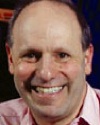
Ted Selker is a man who lives at the intersection of form and function. When one or the other dominates, it results either in a beautiful product that doesn't work, or a wonderfully functioning product that nobody wants. In his work, he constantly seeks to bridge the distance between the two.
In this extemporaneous talk, Selker demonstrates some of the many design and engineering solutions he has had a hand in developing throughout his career. As a self-proclaimed "swiss army knife" inventor, he often designs objects that have multiple applications or features.
Selker shares stories about how many of his inventions were created, revealing his process and thoughts about the way people interact with technology.
Ted Selker is associate director of mobility research at CMU and a visiting scholar at Stanford computer science department. He is known for guiding, demonstrating, and speaking about strategic emerging technology opportunities. He specializes in seeding strategic conversations and in creating targeted workshops to teach and guide invention and innovation.
Ted spent ten years as an associate professor at the MIT Media Laboratory, where he created the Context Aware Computing group, co-directed the Caltech/MIT Voting Technology Project, and directed a CI/IDI: kitchen of the future/product design of the future project. His work is noted for creating demonstrations of a world in which intentions are recognized and respected in complex domains, such as kitchens, cars, on phones and in email.
Ted's work takes the form of prototyping concept products supported by cognitive science research. He earned the role of IBM Fellow and director of User Systems Ergonomics Research and has served as a consulting professor at Stanford University, taught at Hampshire, University of Massachusetts at Amherst, and Brown Universities, and worked at Xerox PARC and Atari Research Labs. In 2004, Ted was co-recipient of the Computer Science Policy Leader Award for Scientific American 50. In 2006, he received the American Association for People with Disabilities Thomas Paine Award for his work on voting technology, and in 2008, he received the Telluride Tech Fest award.
Resources
This free podcast is from our BayCHI series.
For The Conversations Network:
Photo: Pam Berry